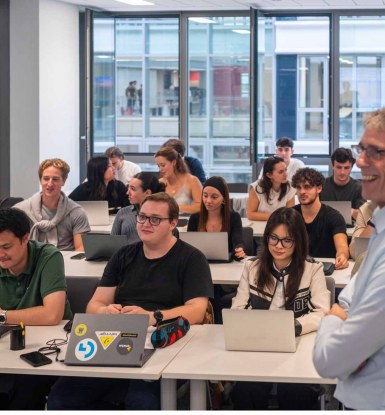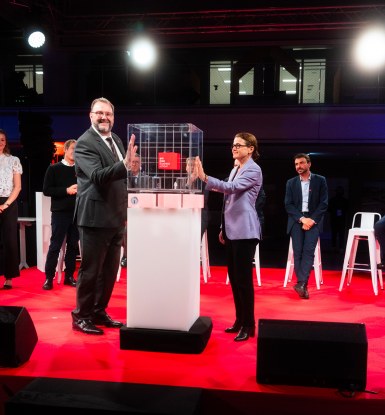Modules presentation
Four modules
The summer school program is designed for senior undergraduate (year 4) and graduate students who want to discover the wine culture and wine marketing, explore the field of luxury branding, delve into the world of sustainable entrepreneurship and explore the AI Nexus.
Our modules are designed to offer an immersion in the French and European culture to participants. They offer:
- Action-based learning program
- Company visits
- International dimension
Key points:
- Delivered on our Lyon campus (France)
- Programs are taught in English
- 6 ECTS per module
- 1 to 2 weeks per module: 28 hours
- Cohort of 40 students (classes for each module will open with a minimum of 15 students enrolled)
Module 1: Wine culture and Wine Marketing
From July 7th to July 18th, 2025
6 ECTS (European Credit Transfer System)
28 hours and corporate visits
Concepts and subjects covered:
- Wine Culture
- Value creation in wine industry
- Status game in wine industry
- Market -driving strategies
The stakes of wine marketing and wine culture are numerous and strategic. Wine lies at the frontier of two contradictory domains: Culture, with its links to art and even magic, and Commerce, with its commodification and appropriation.
As a product coming from both agriculture and craftmanship, wine is a boundary object. Throughout its long history, wine has become a cultural object. And in the meantime, it is also an object that is sold and marketed. But culture cannot be appropriated and sold.
New countries have started producing wines that compete with historical wine producers. Large conglomerates are entering the strategic niches of independent tiny producers.
Module 2: Luxury Branding
From July 7th to July 18th, 2025
6 ECTS (European Credit Transfer System)
28 hours and corporate visits
Concepts and subjects covered:
- Emerging branding trends in Europe
- Sustainability and ethical branding
- Cross-cultural brand adaptation
- Impact of technology on branding
This course examines the latest trends shaping the branding landscape, with a specific focus on the European market. Students will analyze how brands are created, developed, and strategically managed in response to evolving consumer expectations and market dynamics. Particular attention is given to building a strong and distinctive brand identity that resonates across diverse cultural, regional, and industry-specific contexts within Europe and beyond. By engaging with case studies, interactive discussions, and practical workshops, participants will gain the skills to design compelling value propositions, position brands strategically, and foster deeper customer engagement. The course also explores pressing challenges in European branding, including sustainability, inclusivity, digital transformation, and the impact of emerging technologies, equipping students to address the demands of a rapidly changing business environment.
Module 3: Sustainable Entrepreneurship
From July 21st to July 31st, 2025
6 ECTS (European Credit Transfer System)
28 hours and corporate visits
Concepts and subjects covered:
- Sustainable business models
- Circular economy and resource efficiency
- Impact measurement and reporting
- Policy and Regulation in Europe
This course provides a comprehensive understanding of sustainable entrepreneurship, focusing on the creation and management of new ventures that balance profitability with environmental and social impact. Students will be developing a Forecast Thinking mindset to navigate uncertainties, optimize decision-making, and design sustainable entrepreneurial strategies in an ever-evolving world. Through in-class simulations, group projects, and interactive discussions, participants will learn to identify opportunities, evaluate their feasibility, and develop strategies for launching and scaling sustainable entrepreneurial ventures. The course will specifically highlight the unique challenges and opportunities faced by European entrepreneurs in implementing sustainable practices within a globalized economy.
Module 4: The AI Nexus: Legal and Data challenges
From July 21st to July 31st, 2025
6 ECTS (European Credit Transfer System)
28 hours and corporate visits
Concepts and subjects covered:
- Data protection and compliance
- Artificial Intelligence and Legal accountability
- Intellectual Property in the digital world
- Blockchain, Smart contracts and generative AI
- Tech Startups and Legal Structuring
This course explores the complex intersection of artificial intelligence, legal frameworks, and data protection in a rapidly evolving technological landscape. Students will examine how to navigate the challenges of AI governance, including compliance with data protection laws, intellectual property rights, and ethical considerations. By balancing the drive for innovation with the need for regulation, the course provides insights into fostering responsible and sustainable AI applications in a data-driven world. Through case studies, expert insights, and interactive discussions, participants will gain the knowledge and tools necessary to address key legal and data challenges associated with AI development and deployment. The course is tailored to equip students with a comprehensive understanding of the legal landscape shaping AI innovation, particularly within European and global contexts.



